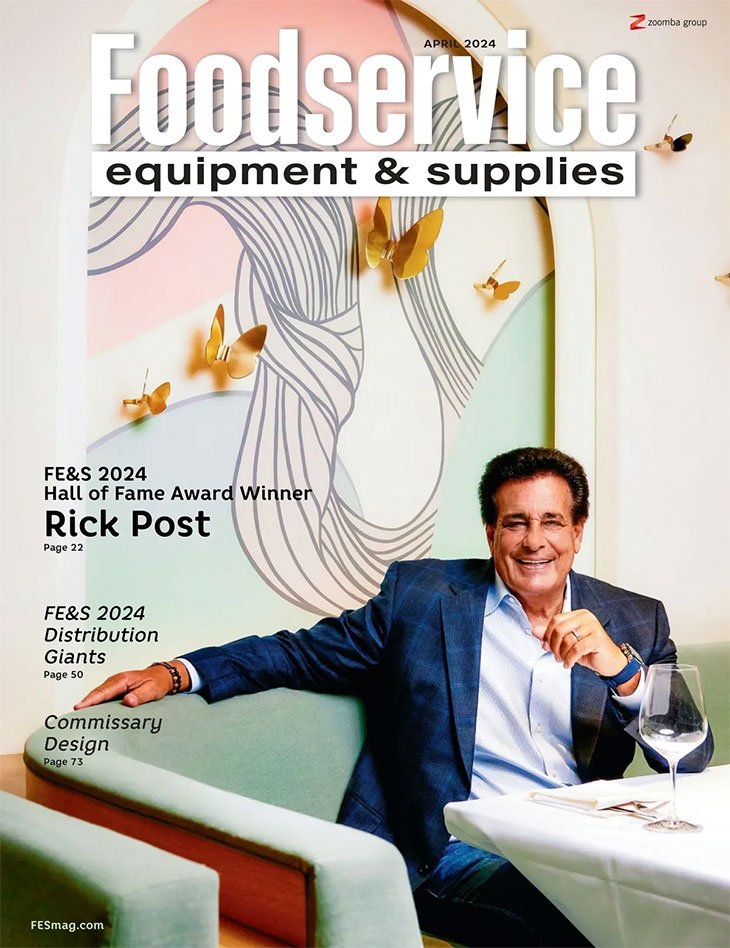Each year, FE&S honors one dealer, consultant, manufacturers' rep and service agent with our Top Achiever awards. Members of these E&S professions are recognized for several reasons, including their development of businesses that set the bar for market dominance and progressive management, their equitable and honorable dealings with channel partners and customers alike, and their contributions to their trade associations and the industry at large.
While all of 2004's Top Achiever award winners have spent many years honing their performances to exceed end-users' expectations, what defines this quartet of leaders best are the many types of achievement that cause them to stand out among their peers. As you read over the profiles that begin on the next page, you'll see that these Top Achievers have dedicated themselves to continuing their professional education and skill-building, to learning how to anticipate customers' needs to keep sales growing and to building market-responsive organizations that provide the maximum number of profitable products and services.
Taken together, what these profiles of our Top Achievers' careers point up is that there is no single path to professional excellence. What they also emphasize, however, is that no one becomes a pacesetter in foodservice E&S without the vision to see beyond the status quo and create the sorts of changes that transform merely good businesses into ones that are enduringly great.
Fred Clark, Clark Food Service Equipment — Dealer
In 1976, Fred Clark joined his family's business, G/L Clark Associates, mechanical contractors, as a certified electrician and, by age 18, was serving as foreman on jobs for the company. In 1978, at an age when many people are attending college and trying to decide which career to pursue, Fred Clark opened Clark Food Service Equipment in his hometown of Intercourse, Pa. This year, Clark is being honored as FE&S' 2004 Top Achiever-Dealer.
"In the Amish country here in Pennsylvania, there was an increase in tourism during the '70s. One of the draws for tourists was the Amish family-style restaurant that became very popular," recalled Clark. "As local mechanical contractors, my family's company was hired to install and service the electrical foodservice equipment found in the kitchens of these restaurants, and I saw the opportunity to open a dealership to provide this equipment. Bottom line, capital is what is needed to open an equipment dealership, and I was fortunate in that the money required to open the dealership was available to me through our family business," he related.
Through Clark's success and savvy business sense, Clark Associates has grown over the years to include millwork and stainless-steel fabrication capabilities. He also created Clark Fire Protection in 1986 to serve the hood fire suppression market, and Noble Chemical, founded in 1990, to cover the warewashing and laundry business. In 1993, Fred Clark took over controlling interest of Clark Associates Inc., which today has over 240 employees, and he has served as president since then.
"The growth of our company was a slow, natural progression," commented Clark, "because the addition of more foodservice-related businesses was simply an outgrowth of what we were already doing. Because of the different businesses under our umbrella, we retain great control over our projects, and can coordinate different aspects of a job through our offices. This obviously helps to make our projects come together much more smoothly."
In 1993, the company moved from Intercourse to Lancaster, Pa., where its cash 'n carry business, The Restaurant Store, opened its first location. Four other locations have been opened since then and plans are in the works to try to initiate other regional locations of The Restaurant Store in the coming year, according to Clark.
"Through The Restaurant Store we can offer customers a huge amount of inventory at low prices because of the minimal overhead built into the concept. We market the stores, which carry everything and anything for the foodservice industry except food, mainly through fliers," explained Clark. "We also maintain a web site for The Restaurant Store that provides information on available inventory. We are currently working on getting an online shopping site up and running and have registered the name of the site, 'The Webstaurant Store.' We're projecting a launch of the site, hopefully, for the third quarter of this year. "I am truly lucky in that I really love my job and the people I work with," continued Clark. "The greatest assets we have as a company are our reputation and our staff. I have a great management team that supports me in my general management responsibilities, including purchasing and vendor relations, and allows me to serve in the industry in a broader capacity." Clark served on the FEDA Board of Directors from 1995-1999 and is currently treasurer of the NAFED buying group. Clark obtained his CFSP certification in 1999 and is currently at Level 1 certification.
Clark and his wife Beth have been married for 24 years and live in Lancaster County, Pa. Their two children, Audrey and Gene, are now both in college. -Laura Doty, Contributing Editor
John Egnor JEM Associates — Consultant
As much as any consultant is synonymous with a particular operator market, John Egnor, president of Linwood, N.J.-based JEM Associates, is identified with the gaming and resort sector. Among the operations for which he has designed foodservices are the Foxwood and Mohegan Sun Casinos in Connecticut and the Borgata Hotel and Casino in Atlantic City.
There is a symmetry in the fact that this specific position of prominence is occupied by Egnor, FE&S' 2004 Top Achiever-Consultant. A native of the East Coast's gaming capital, Atlantic City, he grew up working in hotels and resorts managed by his father.
Egnor did not take a straight path to the foodservice consulting profession, however. Before founding JEM in 1991, he had worked as a teacher, a project manager for a sheet-metal contractor and a principal of a design/build E&S dealership, among other professions.
"I grew up around hospitality and resorts in Atlantic City, so that type of business was familiar to me," he recalled. "When Atlantic City started to allow gaming back in 1977, I was fresh out of college and looking for something to do. I got involved on the construction side as a plumber and my career path just evolved over the years. When I became a consultant, it was natural that I would do work in casinos."
Now, 14 years after its founding, JEM employs 17 individuals. It completed 132 projects in 2003, including work for some of the world's largest hotel and gaming companies.
One of the factors in JEM's success, Egnor said, is the firm's attention to basic principles of foodservice design, such as limiting the amount of cross-traffic in a kitchen and establishing a good flow among a facility's components (supply areas to prep areas and prep areas to cooking lines, for example). "Everything we design is based on the goal of being operationally sound. It won't always be the perfect design, but as long as it's sound it will be functional, which means that anybody can make it work," he stated.
In addition to this focus on design fundamentals, Egnor's approach to his profession is one that emphasizes collaboration with clients and associates, an attitude some feel is lacking in the consulting profession as a whole.
"Consultants don't know everything," he stressed. "Good consultants draw out the best from all the people they work with. They listen to project partners and clients, ask questions and use the information they gather to create what is potentially the best possible design, the best possible solution. Consultants should never tell you what to do. They should listen to what you say, evaluate it, educate themselves and everyone else around them, and provide options to help a project go forward."
This respect for the opinions and positions of other channel partners is borne out in Egnor's industry involvement, as well. An active member of the foodservice E&S industry, he sits on the board of directors of FCSI's North American division and is a member of the society's Industry Association Liaison committee and of the planning team for FCSI's 2004 conference in Toronto.
And his industry activity is not limited to meetings and planning committees. He will also openly address difficult subjects head-on. For instance, Egnor is participating in the composition of an FCSI white-paper that will present the case for single-source specification by consultants, and he openly questions the practical value of dealer buying groups in a market beset by over-capacity. Egnor takes these positions, though, not out of a desire for conflict or controversy, but because he wants what he believes is best for the entire foodservice E&S supply chain.
"I really love and have a strong respect for our industry," he stated. "That's why I'm concerned with all its workings; not just foodservice design, but how the manufacturers are doing, how dealers represent themselves, how end-users are dealt with and how people are served."
Pete Stryker, Miller & Stryker Associates — Manufacturers' Representative
Pete Stryker, FE&S' Top Achiever-Manufacturers' Representative for 2004, has built his career around a willingness to extend service and respect to other members of the foodservice E&S supply chain. Stryker, 56, is a principal of Wood Dale, Ill.-based Miller & Stryker Associates, a firm he founded with friend Barrie Miller in 1986. Today, Miller & Stryker employs six individuals and represents 13 manufacturers. It was responsible for more than $10 million in sales during 2003. Structurally, Miller & Stryker is very much designed to support the needs and the work practices of dealer sales representatives.
For instance, from its inception the firm has bucked traditional rep practice and carried both equipment and supplies lines. According to Stryker, this strategy was chosen in recognition of the fact that most DSRs do, in reality, sell both types of products. By representing both equipment and supplies, the firm can be of greater use to dealer salespeople, a development that is also of benefit to his company, Stryker said.
"When you represent a supply line, you're in contact with dealer sales representatives a lot," he stated. "So, when they need help with equipment, which is much less frequently, they'll call you. ... Dealer salespeople just want to get the job done, and we want to be the go-to people who help them do that."
Miller & Stryker has taken other, smaller steps to ensure it provides valued services to DSRs. For instance, the company's hours are from 6 a.m. to 6 p.m. (Central Time), reflecting the long days typically put in by dealer sales staffs, and it employs three full-time, in-house customer service agents. Perhaps this empathy for other members of the supply chain is rooted in Stryker's professional history before becoming a rep.
In 1979, after spending much of his professional life working for food manufacturers, Stryker joined a supplies manufacturer in the role of general manager. He spent the next seven years with the company, which was acquired about a year after his departure. (It was Stryker's belief that the company would be sold, in fact, that led him to leave to become an independent representative.)
However, the time he spent with this manufacturer, Stryker said, likely has made him more understanding of the needs of other distribution channel members. "Having come from the manufacturers' side, I think I'm possibly more sensitive, more concerned, more focused on ensuring that our factories profit from their relationships with us than someone who doesn't have that background," he stated.
"Manufacturers have to make a profit and reps are responsible for helping them move toward that goal. The dealers also have to make a profit and representatives can help in that effort in numerous ways. Figuring out which services to provide to your particular channel partners helps you resolve part of the overall business puzzle."
Having such a holistic view of the industry has made Stryker particularly concerned about the conflicts that are currently being played out in the food-service E&S sector.
Everyone, from manufacturers to end-users, he stressed, is suffering margin pressures. This situation has led conflicts to evolve beyond simple disagreements into situations where channel members are treating each other with a genuine lack of respect. While the pressure-induced emotions may be understandable, they ultimately are counterproductive for each individual supply chain member and for the industry as a whole, he stated.
"When you get hostility on the part of dealers or manufacturers - it goes both ways - you get all sorts of threats and unproductive approaches in an industry that doesn't need to bother with that. We need to worry about helping our end-users," he pointed out. "To me, it seems like relationships don't work as well if those involved don't have respect for each other. Not that you aren't going to negotiate hard or fuss sometimes, but there needs to be respect. We've got to be world-class. It isn't like we have a choice."
Stryker lives in Naperville, Ill., with his wife of 33 years, Charlotte. They have two children: Andrew, 29, and Gretchen, 26. - Toby Weber, Contributing Editor
Tom Walter, Nass Parts & Service Inc. — Service Agent
Tom Walter's career at Nass Parts & Service, Orlando, Fla., is a testament to his work ethic, vision, and willingness to take on a challenge. It is these qualities that have carried Walter to his current position as owner and president of this company and earned him the honor of being named FE&S' 2004 Top Achiever-Service Agent. Prior to joining Nass in 1982 as a service manager, Walter had a career in the retail jewelry business, working as a general manager for Gordon's Jewelers in several Florida regions. Walter's wife Debi had been an employee at Nass since high school, even before the couple had met, and she had continued working for the company in the Miami area after marriage to Walter and his job-related relocation from Orlando to Miami. After the birth of their first son and a move back to Orlando, Walter was looking for a change. "Debi told me about the opening at Nass, and I took the job, believing that a service manager's hours would be more conducive to family life," recalled Walter. "I was a little bit naive about that because, although my past work history included management experience, my technical background was extremely limited. From the moment I started at Nass, I was immersed in on-the-job training, and I decided that I would get in there and learn as much as possible about the job on every level I could.
"Back then, CFESA didn't offer the formalized training in servicing steam, gas, electrical and refrigeration equipment that is available now, so I would participate in any factory training programs that were offered," continued Walter. "I also decided that this would be a good time to pursue the Certified Foodservice Professional (CFSP) training as it could provide me with an overview of the whole industry. In this way, I threw myself into learning every aspect of the foodservice business."
Nass Parts & Service was established in 1949 by W.L. Nass and, by the late 1990s, Glen Nass, the second-generation owner, was no longer involved in day-to-day operations and was contemplating retirement. "An industry friend suggested that I should think about buying the company and, although this possibility hadn't really occurred to me, I began to explore its feasibility," related Walter. "In a casual context, having dinner one evening with Glen Nass and Bill Friedman, my immediate superior at Nass, I mentioned that if Glen was thinking of selling the company, he should give me the first chance to buy it. Glen and Bill were interested. Glen had previously sold his Miami branch to a business outside of the industry and they hadn't done well with the branch. The concept of me owning the firm seemed to be a good fit for all concerned and so it came to pass that I purchased the company in 1998," he noted.
"I had to start my on-the-job training all over again as company owner, especially in learning to delegate and get out of the way," Walter said with a laugh. "Luckily, I'm surrounded here by incredibly gifted people that I look up to, so I'm constantly asking for their input as to how I can improve my performance. I was given a great bit of advice from David Hatch of Hatco about how to succeed in this business. David said, 'Hire the best people, pay them what they're worth, share the vision of the company and leave them alone.' I believe in investing in employees and respecting them as people, and the best people find me because of this company's reputation," Walter explained. "We're not known as the biggest service company in Florida, but I believe we're known as the best."
Looking ahead, Walter noted that the company is progressively becoming more involved with the installation of equipment from the beginning of a project to start-up and he predicted a controlled expansion at Nass. Upgrading computer software is also a priority this year, to improve efficiency in tracking warranties and payments, and reporting to customers.
Married to his wife for over 25 years, Walter has three children, all of whom are now in college. "If you would have told me when I was around my children's age that I would be involved in the business I'm in, and enjoying it so much, I would have thought you were crazy," Walter concluded. "But I enjoy the people I work with and thrive on helping others achieve their success, because therein lies our success." - Laura Doty, Contributing Editor




